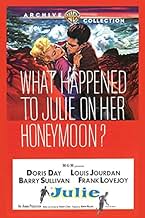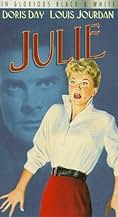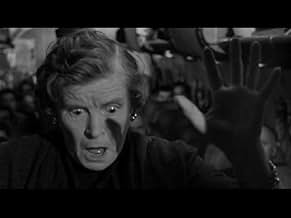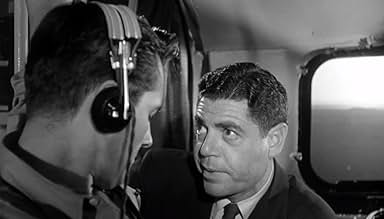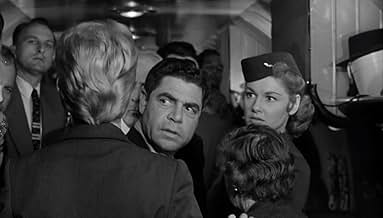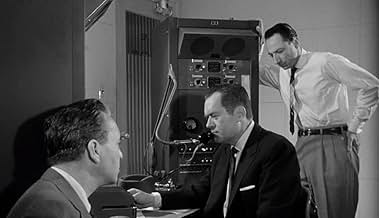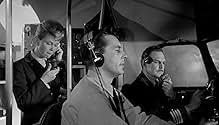IMDb RATING
6.2/10
2.4K
YOUR RATING
A terrified wife tries to escape from her insanely jealous husband who is bent on killing her.A terrified wife tries to escape from her insanely jealous husband who is bent on killing her.A terrified wife tries to escape from her insanely jealous husband who is bent on killing her.
- Nominated for 2 Oscars
- 2 nominations total
Pamela Duncan
- Peggy Davis
- (uncredited)
- Director
- Writer
- All cast & crew
- Production, box office & more at IMDbPro
6.22.3K
1
2
3
4
5
6
7
8
9
10
Featured reviews
May Day!! This film is dangerous! (dangerously funny)
Most comedy movies could only hope to be this amusing. An airy, drippy title song plays, setting up the audience for some sort of romantic drama. No such luck. Immediately (and hilariously at odds with the opening music), Day comes running on, desperately trying to avoid her husband (Jourdon), who has apparently made a scene over her attention to another man. She hops in her car and he joins her. Even though the road is almost perfectly straight, Day spins the hell out of her steering wheel, furiously wielding it back and forth on a straight road! This overwrought and overheated beginning is merely a prelude for the wildly illogical and melodramatic story that follows. Jourdon turns out to be a crazed, obsessive danger to Day and the film involves her repeated attempts to get away from him before he kills her. Ms. Day is a delightful screen presence and is certainly capable, in the right hands, of delivering a terrific dramatic performance (i.e.--Hitchcock's "The Man Who Knew Too Much".) Here, however, she is up against a heinous script (astonishingly nominated for an Oscar!) and contrived, silly situations which make her look foolish. Worst of all is her (hysterically funny) series of dramatic voice-overs. The production feels the need to have her breathlessly describe all her feelings and state what is clearly happening on screen! The wording is often fall down funny and her despairing delivery paired with the stark visuals pair up to create several moments of screaming laughter. One scene has her "desperately" trying to get away from Jourdon, but she still manages to pack her favorite outfits and even seemingly make sure she selects the right purse to go with her shoes. Another has her running from him in a snug skirt until she falls on a big rock and lays there. The whole movie is filmed with a crisp, clinical detachment since this was a bold new subject and all the happenings were so bleak and gripping. This makes for some really dry viewing today, especially when the (inept) police do their thing and during the climax when realistic (but uninteresting) air traffic controllers communicate with Day. Day, a stewardess, gets a breather midway through to scramble some eggs and sashay around in a kicky one piece lounge suit (and act as if nothing is wrong with her life!) In this section, the demure, twice-married character even refuses to come out and meet a gentleman her makeshift roomie is dating because she's not dressed (even though her full-length nightgown comes down to her knuckles and almost reaches her ears! Yes... women just didn't DO that, but it's still amusing!) Stay tuned for the really kooky climax in which she and one other stewardess work a flight in which Day doesn't even realize that Jourdon in ON board! (Like a person wouldn't immediately pick out someone who they know is out to kill them!) Situations eventually warrant that Day has to fly and land the plane herself (Karen Black fans will be disappointed to learn that she wasn't the first woman in this predicament. Cross-eyed Black did it in "Airport 1975", but Day beat her by 19 years....and she flies a significant portion of the trip with her eyes CLOSED!! Notably, with regards to sexism, little had changed in those two decades, for the men call Day "honey" the whole time while in Black's case, they continuously called her "honey" and "baby"...) So many other ripe moments have been left out, but in any case, the film is a scream. Jourdon is indeed surprisingly menacing and Day tries very hard (and found the filming very difficult in real life.) Also fun is a glimpse at how dressy and glamorous airports used to be and how much air travel has changed. Don't miss the amateur actress playing an apartment resident who, when asked about Day's character, pronounces "Julie" as "Julah".
Last-minute shift of gears turns Julie into routine "jep"
A thriller starring Doris Day a few years before she hit the jackpot with her string of coy sex comedies, Julie is what was known in the trade as a `jep' a woman-in-jeopardy drama. It starts off promisingly with a spat at a country club between Day and her second husband, Louis Jourdan (the first Mr. Day, a presumed suicide, may have been his victim) that escalates into an incident of road rage. Jourdan is passed off as a concert pianist you know, one of those unstable `artistic' types. And he fills out a startlingly up-to-date profile of the irrationally jealous, controlling spouse, alternating between murderous rages and mawkish contrition. (Since Charles Boyer launched the prototype of this sort of abusive male in Gaslight, it seems that Hollywood thought it safe to cast chiefly Frenchmen in subsequent outings.)
Julie wastes no time in setting Day to flee, with Jourdan in pursuit; her ally is old friend Barry Sullivan, who tries to smuggle her safely from Carmel to San Francisco. But Jourdan, who apparently missed his calling as an international master of intrigue, proves too smart for them and manages to get himself, gun in trenchcoat, aboard a cross-continental airliner.
Julie, you see, used to be an airline stewardess, and here is where the script's credibility ultimately crumbles. As the movie prepares to come in for a landing, it abruptly shifts gears, leaving behind the dark psychological drama of the noir cycle for the purely mechanical thrills of an Airport. And so what at first seemed daring revealing Jourdan as a woman-hating psycho without a tedious buildup turns into a time-saving gimmick to place Day as swiftly as possible behind the controls of an airplane. And so what started out as a psychologically astute study of obsession descends into the merely routine.
Julie wastes no time in setting Day to flee, with Jourdan in pursuit; her ally is old friend Barry Sullivan, who tries to smuggle her safely from Carmel to San Francisco. But Jourdan, who apparently missed his calling as an international master of intrigue, proves too smart for them and manages to get himself, gun in trenchcoat, aboard a cross-continental airliner.
Julie, you see, used to be an airline stewardess, and here is where the script's credibility ultimately crumbles. As the movie prepares to come in for a landing, it abruptly shifts gears, leaving behind the dark psychological drama of the noir cycle for the purely mechanical thrills of an Airport. And so what at first seemed daring revealing Jourdan as a woman-hating psycho without a tedious buildup turns into a time-saving gimmick to place Day as swiftly as possible behind the controls of an airplane. And so what started out as a psychologically astute study of obsession descends into the merely routine.
As a Doris Day fan, I enjoyed it.
I was disappointed that Doris Day only sang one song for this movie and it was played and over by the end of the opening credits. The road rage scene was exciting, but if you've ever driven on a winding road like that one in Monterey/Carmel, you know there would be no way to avoid going off the road in that situation.
The story was pretty good though. The wife who fears her husband will kill her and the police cannot help her without any evidence. She tries to get away, but he figures out every move she makes and it all comes down to a climatic ending.
I think the plane landing was done well. Doris Day was very convincing in her role. I really enjoyed her as an actress for this movie, when I normally think of her as a wonderful singer.
The story was pretty good though. The wife who fears her husband will kill her and the police cannot help her without any evidence. She tries to get away, but he figures out every move she makes and it all comes down to a climatic ending.
I think the plane landing was done well. Doris Day was very convincing in her role. I really enjoyed her as an actress for this movie, when I normally think of her as a wonderful singer.
Provides realism as well as suspense.
The writer-director (and producer of many other films, although not this one) Andrew L. Stone was only nominated once for an Academy Award for Best Screenplay, and he was very proud of this one. I worked for Stone in the mid-1970's, and he looked back at "JULIE" as a piece of his finest work.
The maniacal husband-as-stalker was a new kind of character for films in 1956. The honest discussion of how law enforcement often failed 'women in jeopardy' brought up issues which only became widely discussed in the 1970's.
Doris Day plays the role of a terrorized wife trying to escape from the husband who is trying to kill her, and this is such a well-done treatment of the subject that even jaded audiences today respond to it.
The climactic scene in which Doris Day lands the passenger plane with help from the control tower is riveting, because it is based on fact. Andrew L. Stone was an exhaustive researcher, and you can be sure every detail of that scene was checked and re-checked. It would have happened in real life just as you see it on the screen.
Stone kept a collection of 'true crime' magazines dating from the 1930's in his office library, and he had dozens of plot ideas for thrillers like this one. However, he had always been his own boss and not a 'studio man'. Hollywood didn't give him big budgets, and he never had the opportunity to continue his career as Hitchcock did. Mentally sharp through his 80's, Stone spent the last decade of his life trying to put deals together to make movies that never got off the ground. Our loss.
The maniacal husband-as-stalker was a new kind of character for films in 1956. The honest discussion of how law enforcement often failed 'women in jeopardy' brought up issues which only became widely discussed in the 1970's.
Doris Day plays the role of a terrorized wife trying to escape from the husband who is trying to kill her, and this is such a well-done treatment of the subject that even jaded audiences today respond to it.
The climactic scene in which Doris Day lands the passenger plane with help from the control tower is riveting, because it is based on fact. Andrew L. Stone was an exhaustive researcher, and you can be sure every detail of that scene was checked and re-checked. It would have happened in real life just as you see it on the screen.
Stone kept a collection of 'true crime' magazines dating from the 1930's in his office library, and he had dozens of plot ideas for thrillers like this one. However, he had always been his own boss and not a 'studio man'. Hollywood didn't give him big budgets, and he never had the opportunity to continue his career as Hitchcock did. Mentally sharp through his 80's, Stone spent the last decade of his life trying to put deals together to make movies that never got off the ground. Our loss.
Boy, is this damsel in distress!!
Doris Day had a few "damsel in distress" roles in her movies, but none requiring her to be quite as stressed out as "Julie". Trouble is the film is a bit too overwrought for comfort with Miss Day being pursued throughout by a maniacal husband (Louis Jourdan) whose only problem is he loves her to death--literally!! And not a single supporting character to give us a few laughs.
The last half-hour aboard an airliner where her husband has managed to become one of the passengers, is the best part of this neat little suspenser. Although all the usual cliches are present in the script, the terrified Doris manages to look convincingly cool and confident as she handles the controls of the airliner for the story's somewhat pat climax.
Louis Jourdan makes the husband look like a really jealous and possessive heel, aside from being a maniac--and since Doris Day reveals in her autobiography that she married a couple of these early on in her career--perhaps that helped her give a very credible performance. Not that she was any slouch in the acting department on a few of her other "damsel in distress" roles--STORM WARNING, THE MAN WHO KNEW TOO MUCH and LOVE ME OR LEAVE ME. Let's forget the phony, overly fabricated MIDNIGHT LACE. Here she gives a strong and sincere performance as a terrified woman.
Barry Sullivan gives excellent support as a friend who tries to help her when the police admit they can't do anything. Frank Lovejoy is also fine as a detective.
I can't say much for the title tune, "Julie", heard only during the credits and then quickly forgotten by me. To my surprise, it was nominated for a Best Song Oscar--so what do I know??
If you're a Doris Day fan, you'll find this suspenseful even though it takes itself much too seriously. There's not a hint of humor throughout the entire proceedings, not a single moment of relief. It's all very, very intense, whereas some humor would have helped.
Of course, there are always those who will laugh at the plot itself. It is, after all, a bit unbelievable by the time stewardess Day takes over the controls. It's to her credit that she makes it look real.
The last half-hour aboard an airliner where her husband has managed to become one of the passengers, is the best part of this neat little suspenser. Although all the usual cliches are present in the script, the terrified Doris manages to look convincingly cool and confident as she handles the controls of the airliner for the story's somewhat pat climax.
Louis Jourdan makes the husband look like a really jealous and possessive heel, aside from being a maniac--and since Doris Day reveals in her autobiography that she married a couple of these early on in her career--perhaps that helped her give a very credible performance. Not that she was any slouch in the acting department on a few of her other "damsel in distress" roles--STORM WARNING, THE MAN WHO KNEW TOO MUCH and LOVE ME OR LEAVE ME. Let's forget the phony, overly fabricated MIDNIGHT LACE. Here she gives a strong and sincere performance as a terrified woman.
Barry Sullivan gives excellent support as a friend who tries to help her when the police admit they can't do anything. Frank Lovejoy is also fine as a detective.
I can't say much for the title tune, "Julie", heard only during the credits and then quickly forgotten by me. To my surprise, it was nominated for a Best Song Oscar--so what do I know??
If you're a Doris Day fan, you'll find this suspenseful even though it takes itself much too seriously. There's not a hint of humor throughout the entire proceedings, not a single moment of relief. It's all very, very intense, whereas some humor would have helped.
Of course, there are always those who will laugh at the plot itself. It is, after all, a bit unbelievable by the time stewardess Day takes over the controls. It's to her credit that she makes it look real.
Did you know
- TriviaDoris Day has written that her close friendship with co-star Louis Jourdan angered her jealous producer husband Martin Melcher, mirroring the character relationships in the film.
- GoofsIn the opening scene, Julie is constantly turning the steering wheel, even when the rear projection shows the car to be moving in a straight line.
- Quotes
Julie Benton: Sergeant, I want to report a murder!
- ConnectionsEdited into The Green Fog (2017)
- SoundtracksMidnight On The Cliff
Composed and Performed by Leonard Pennario
Orchestrated by Lucien Cailliet (uncredited)
- How long is Julie?Powered by Alexa
Details
Box office
- Budget
- $785,000 (estimated)
- Runtime
- 1h 39m(99 min)
- Color
Contribute to this page
Suggest an edit or add missing content


